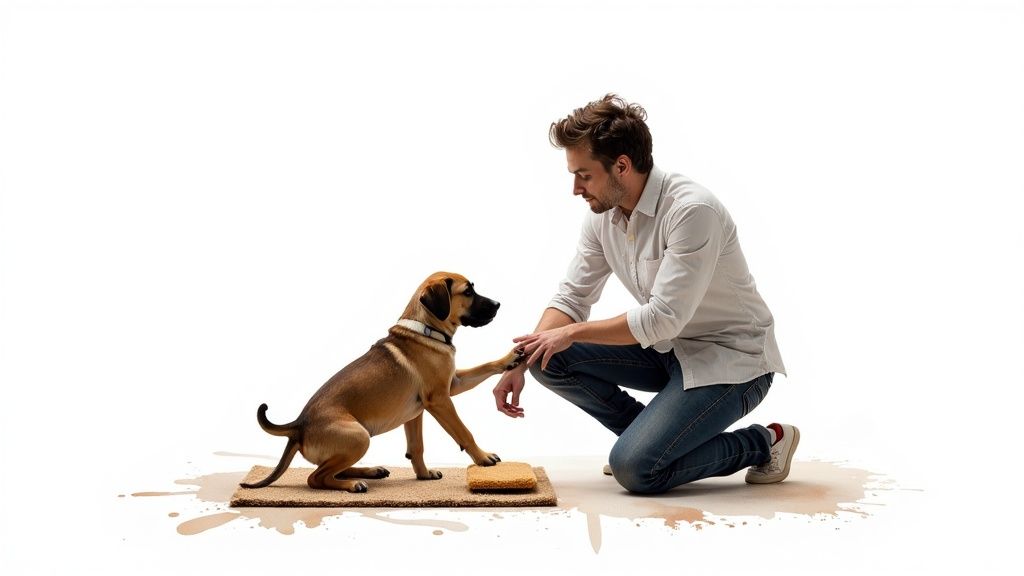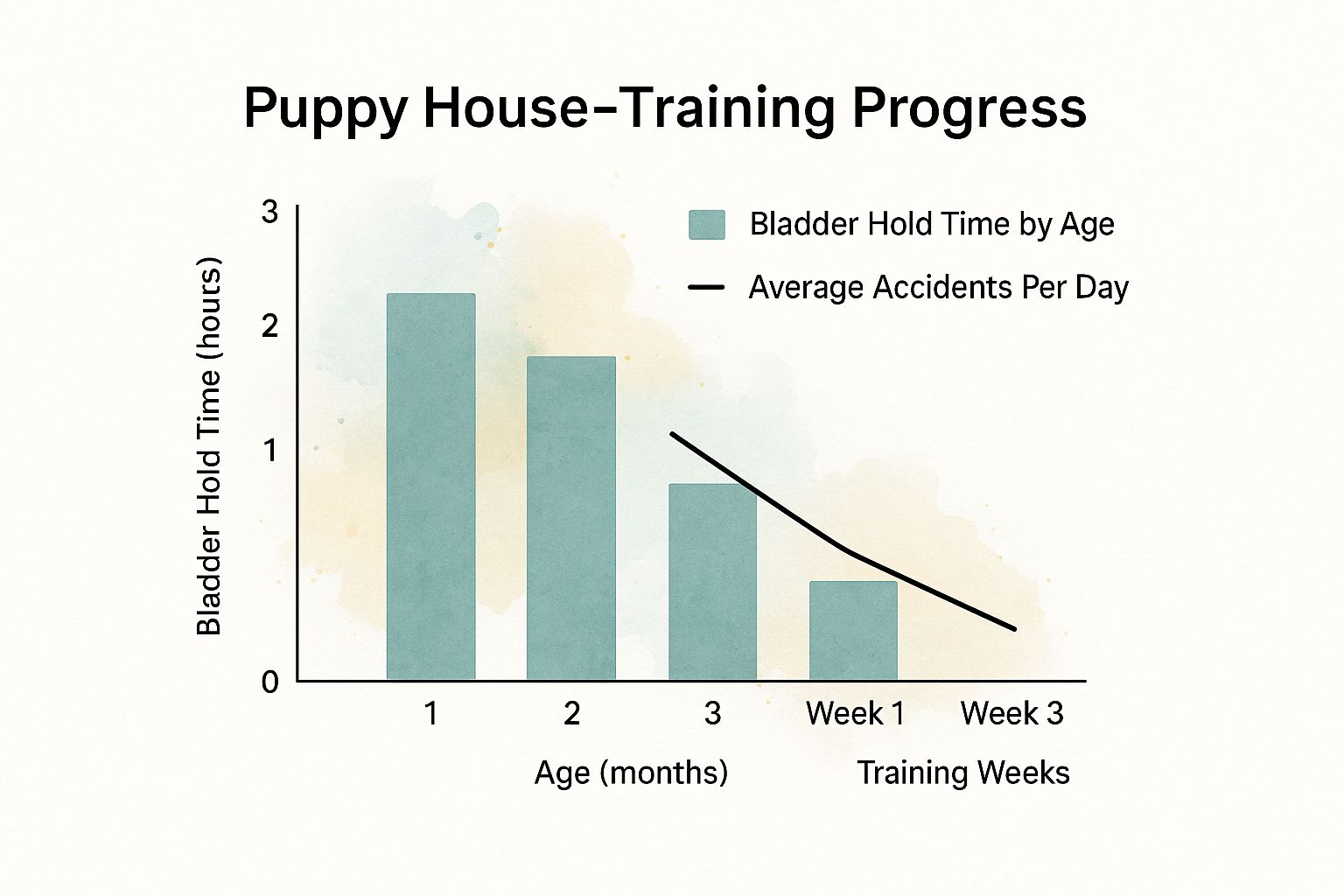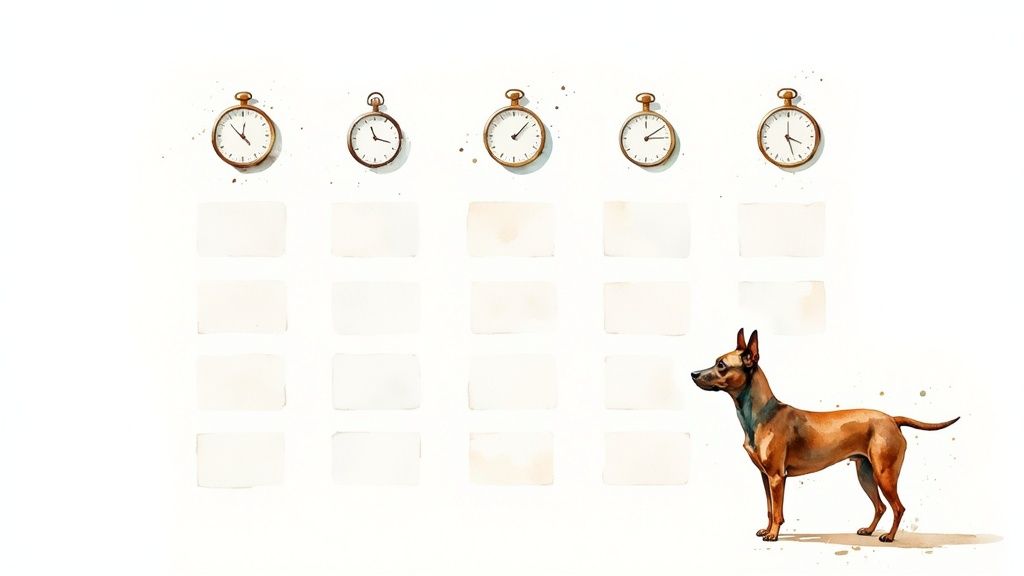Recognizing When You Need Professional Help
Let's be honest, most of us stubbornly try to tackle dog potty training on our own for way too long. It's easy to feel defeated when your furry pal just isn't getting it, even after weeks of dedicated effort. Trust me, I've been there, and I've talked to countless dog owners who have too. Sometimes, the smartest move is to call in reinforcements – a qualified dog trainer.
Sometimes, you're facing a situation that's just beyond the scope of DIY potty training. Think about a rescue dog with serious anxiety around elimination, or that tenacious terrier who, despite your best efforts, is convinced your living room rug is an acceptable potty spot. These are real-life scenarios where going it alone can be incredibly challenging. You might be interested in: Pencil news
What might seem like a behavioral issue could actually be something medical. Your pup might not be being disobedient; maybe they have a health condition affecting their bladder control. Or perhaps you're working with a breed known for potty training challenges. Dalmatians, for example, have a reputation for being stubborn. A skilled dog trainer can help pinpoint the root cause and steer you in the right direction. Potty training isn't a quick fix; it requires patience and consistency. It can realistically take anywhere from 4 to 12 months to fully potty train a dog, influenced by things like breed and individual personality. While specific data on potty training success rates in India is hard to come by, the core principles are universal: consistent schedules, positive reinforcement, and careful observation. Discover more insights about potty training.

Waiting too long to get professional help can actually make the problem worse. Bad habits become ingrained and tougher to break, and your frustration can strain your relationship with your dog. Knowing the difference between a normal puppy learning curve and a persistent problem is crucial. A dog trainer offers an objective perspective and customized strategies, saving you unnecessary stress and creating a more positive potty training experience for both you and your pup.
Evaluating Trainers Who Actually Know Their Stuff
Finding a dog trainer for potty training isn't just about teaching basic commands. It's about finding an expert who truly gets canine elimination behavior – and trust me, it's more complex than you might think. Anyone can slap a "dog trainer" label on themselves, so how do you separate the pros from the pretenders?
Certifications can be a helpful starting point, but remember, they're not all equal. Some signify serious training and expertise, while others... not so much. Do your homework! Ask potential trainers about their specific certifications and what they involved.

This infographic gives you a visual of a puppy's bladder capacity (and how long they can hold it!), increasing roughly an hour per month. It also shows the typical number of accidents during a three-week training period. Notice how accidents decrease, but understanding your pup's physical limits is key. For example, a two-month-old puppy isn't realistically going to hold it for more than two hours.
Tap into the wisdom of other dog owners, too. Personal recommendations and online reviews can be gold mines of information, especially when you're looking for potty training success stories.
Beyond certifications, consider the trainer's philosophy. Do they lean towards positive reinforcement, or do they use other methods? There’s no right or wrong answer here; it's all about finding a trainer whose approach resonates with you and your dog's personality. What works for a bouncy Beagle might not work for a sensitive Shiba Inu.
Digging Deeper During the Consultation
The initial consultation is your chance to really get to know the trainer. Ask about their experience with potty training challenges. A seasoned trainer will have a wealth of stories about setbacks and the creative solutions they used to overcome them. They should be able to clearly explain their training process and answer all your questions honestly.
Red flag alert: Be wary of trainers who make unrealistic promises or brush off your concerns. House training takes time and patience. A good trainer will be upfront about that. They should also be able to share specific examples of their potty training triumphs, especially with cases similar to yours.
Finally, trust your gut. Does this trainer feel like someone you can connect with and communicate with easily? Building a strong trainer-owner-dog relationship is essential for potty training success.
To help you navigate the world of dog trainer certifications, I've put together this handy table:
Trainer Certification Guide: What Really Matters This table compares different training certifications, their requirements, and how they relate to house training expertise. It's a quick way to see what each certification focuses on.
| Certification | Training Hours Required | House Training Focus | Industry Value |
|---|---|---|---|
| Certification A | 200 | Moderate | High |
| Certification B | 100 | Minimal | Medium |
| Certification C | 300 | Significant | High |
| Certification D | 50 | Low | Low |
Note: This table is a placeholder and should be populated with real certification data.
As you can see, the required training hours and focus on house training can vary significantly. Do some research to find certifications that prioritize the skills you're looking for in a potty training specialist!
The Changing Landscape of Professional Pet Training

Things have really changed in the pet world. Remember when hiring a dog trainer, especially just for potty training, felt like a splurge? Now, so many pet parents see it as essential preventative care. And honestly, I get it. Early training can save you so much time, frustration, and maybe even a few rugs!
This shift has totally changed how we find and choose trainers, too. More people are getting pets, which naturally means more trainers are popping up. But their qualifications? Let's just say they can be all over the map. So, how do you find the right one in this ever-growing market?
Finding the Right Fit for You and Your Pup
Finding a trainer who's on the same page as you is crucial. You don't want a quick fix; you want someone who sees potty training as a stepping stone to a well-adjusted dog. It's about the big picture! Think of it like building a strong foundation. You might find some helpful tips in more articles on dog training.
Look beyond the buzzwords and trendy methods. Real experience matters. Also, consider your dog's specific needs. Some breeds need a more tailored approach, like the ones mentioned in this helpful article (link missing in original text - please provide if available). This individualized training is becoming super important, especially in places like India where pet ownership (and the need for trainers!) is booming.
The Growing Need for Potty Training in India
The pet industry in India is exploding! Think 32 million pets, and that number is growing by over 12% each year. Millennials are driving this growth, which means a higher demand for services like, you guessed it, potty training. While finding solid data specifically on potty training in India is tough, this pet population boom tells us a lot.
Training, especially potty training, is becoming less of a "nice-to-have" and more of a "must-have." So many pet owners are turning to professionals for help. Discover more insights.
The bottom line? There are more trainer options than ever, but doing your homework is key. Don't be shy about asking tough questions. Look for those trainers who can back up their promises with real-world results.
What Really Happens During Professional Training
Let's face it, those picture-perfect dog training videos online don’t always show the whole story. Potty training isn't a quick fix, and it's definitely not something a trainer can magically handle on their own. It’s a partnership, a real team effort between you, your dog, and the trainer.
Understanding Different Training Formats
There are a few ways professional potty training can go down. You’ve got intensive in-home programs, where the trainer comes to you and works with your dog one-on-one in your actual house. This is fantastic for personalized attention and tackling those pesky environmental triggers specific to your home.
Then there are group classes. These are usually more budget-friendly and offer a great chance for your pup to socialize and learn from other dogs. I remember taking my overly enthusiastic Labrador, Gus, to puppy classes; it was chaos, but he loved it, and honestly, the other puppy parents commiserating made it all worth it.
Finally, some trainers offer a hybrid approach, mixing individual sessions with group classes. This can be a nice balance of focused training and social interaction.
The best format depends on your pup’s personality, your lifestyle, and your budget. A shy dog might do better in a one-on-one environment, while a more outgoing dog might thrive in a group setting. Your trainer can help you figure out the best fit during your initial consultation.
The Assessment: Getting to Know Your Dog
Most trainers will start with an assessment session. This isn’t about judging you or your dog! It's about the trainer observing your dog's behavior, understanding their learning style, and figuring out if there are any underlying issues that might be making potty training tricky.
For example, a rescue dog might have some past trauma associated with elimination, making them nervous about going potty in front of you. Or, a puppy might simply not have the bladder control yet to hold it for very long. My friend’s Chihuahua puppy was so tiny, she’d have to go every hour! These assessments help the trainer create a training plan tailored to your dog’s unique needs.
Measuring Progress and Addressing Setbacks
Let’s be real: progress isn't always a straight line. Some dogs get it right away, while others need more time and patience. Your trainer will help you set realistic goals and monitor your dog's progress. This could involve keeping a potty diary, noting accidents, successes, and any patterns you notice.
Speaking of setbacks, it’s important to be totally honest with your trainer if things aren’t going as planned. Maybe your dog is struggling with a specific part of the training, or maybe you're having a hard time putting the strategies into practice between sessions. Open communication is essential. A good trainer will adjust the training approach as needed and provide ongoing support.
Remember, training isn't just about the cost of the sessions. It’s an investment of your time, consistency, and emotional energy. There will be frustrating moments, but celebrate those small victories! With a little persistence and the right guidance, you and your furry friend will get there.
To help you visualize the various program options, take a look at this comparison table:
Training Program Comparison: Finding Your Fit Compare different house training program formats, timelines, investment levels, and success factors
| Program Type | Typical Duration | Investment Range | Success Factors | Best Match For |
|---|---|---|---|---|
| In-Home Private Training | Varies, typically 1-4 weeks | $300 - $1000+ | Personalized attention, addresses specific environmental triggers, convenient | Owners who prefer one-on-one guidance, have busy schedules, dogs with specific behavioral issues |
| Group Classes | 4-8 weeks | $100 - $300 | Socialization opportunities, cost-effective, structured learning environment | Owners seeking a more affordable option, dogs who enjoy social interaction |
| Hybrid Training | Varies | $200 - $800+ | Combines benefits of private and group training, flexible | Owners wanting a balanced approach, dogs who benefit from both individual and group learning |
This table summarizes the different types of training programs, giving you a snapshot of the time commitment and cost involved. Remember, these are just estimates, and the actual duration and cost will depend on your individual circumstances and the trainer you choose. Talk to a few trainers and get a feel for what they offer. Finding the right fit for you and your dog is key to a successful potty training journey.
Building a Successful Training Partnership

Even the best dog trainer can't potty train your pup solo. You're a vital part of the team! Potty training works best when you understand your role and really dive in. Think of it as a three-way partnership: you, your furry friend, and the trainer, all working toward a potty-trained paradise.
Communication is Key: Staying Connected With Your Trainer
Keeping the lines of communication open with your trainer is super important. This means consistently using the training techniques they teach you between sessions. It also means speaking up if something isn't working for you or your dog before it becomes a major headache.
For example, I once worked with a trainer who taught a really cool method for teaching my dog to signal when he needed to go out. But for whatever reason, we just couldn’t get it down. I was hesitant to say anything, thinking I was the problem. But when I finally voiced my concerns, the trainer was able to show me a different approach, and it worked like a charm!
Don’t just be a bystander in this process. Be an active participant. This includes keeping good records of your dog's potty habits - when they go, where they go, and any accidents. This info is pure gold for your trainer.
Working Through Challenges Together
What happens when you and your trainer disagree? It’s bound to happen! Remember that open communication we talked about? This is where it’s really important. Respectfully discussing different approaches and tweaking the training plan based on your dog's individual needs is completely normal. One size doesn't fit all in dog training! A method that works for one dog might not be the right fit for another.
Knowing When to Move On
Sometimes, despite everyone's best efforts, a trainer-client relationship just doesn't click. It’s okay to recognize when it’s time to consider someone new. If you’re not seeing progress, or if you feel like the trainer isn't listening to your concerns, it might be time for a change. This doesn’t mean anyone has failed. It simply means this particular partnership isn’t the right fit. Finding a trainer who gets your dog and your training goals is crucial for success.
The Real Value of Professional Training Investment
Let's be honest, potty training a puppy can be...challenging. Investing in a professional dog trainer is about so much more than just accident-free carpets. It's about investing in a happy, well-adjusted pup, a stronger bond between you two, and, let's face it, your own peace of mind. Think about it: how much is a good night's sleep worth? Or not having to constantly worry about surprise puddles when friends come over?
These days, responsible pet parents know that training, especially potty training, is just as important as vaccinations and regular vet checkups. It’s a fundamental part of good pet care. This shift in perspective is changing how we view pet ownership and the role of professional trainers.
It’s interesting to look at the broader pet care industry too. The global market for pet products is enormous and continues to grow. For example, the pet pee pad market alone was valued at US$ 366.75 million in 2023 and is projected to grow at a CAGR of 8.7% between 2023 and 2033. That's a serious investment in pet well-being! While these numbers don't specifically reflect the dog trainer market in India, they do highlight the global trend toward better pet care, which likely influences the demand for skilled trainers in our region, too. Find out more about the pet pee pad market.
Beyond the Basics: The Long-Term Benefits
So, what exactly makes professional potty training so valuable? Here’s the real scoop:
-
Property Protection: Say goodbye to stained rugs and that lingering "puppy smell." Professional training gets to the root of the issue, preventing accidents before they happen.
-
Stress Reduction: Imagine coming home to a clean house and a relaxed dog. That's the power of effective potty training. It removes a major source of stress for both you and your pup.
-
Bonding Experience: Working through training together builds trust and understanding. It's a shared experience that strengthens your connection in a meaningful way.
-
Foundation for Future Success: A dog who's nailed potty training is often more receptive to other training, like obedience and socialization. It sets them up for a lifetime of good behavior. A solid foundation in potty training can also help prevent future behavioral issues, which can be costly and time-consuming to address. Interested in keeping your pet safe? You might be interested in: Pencil Pet Tracker.
Successful potty training isn’t a quick fix; it’s an investment in a harmonious home where everyone, furry and otherwise, can thrive. It’s about building a happy, healthy relationship with your dog that lasts a lifetime.
Your Roadmap to House Training Success
So, you've got a handle on what to look for in a dog trainer for potty training. Awesome! Now, let's talk about putting that knowledge into action. Think of this less as a rigid set of steps and more like a friendly guide to get you started.
First things first, create a checklist. Jot down those must-have certifications, the training philosophies that vibe with you (like positive reinforcement, for example), and the trainer's experience level you're after. If positive reinforcement is your jam, definitely make a note to ask potential trainers specifically about their methods.
Preparing some insightful questions for your consultations is key. Don't just ask about rates – really dig in. Ask about their experience with specific potty training hurdles, like a dog who's a ninja at hiding accidents. This shows you're serious and have done your research. Speaking of research, check out this visual: This Wikipedia screenshot shows just how many different training methods there are out there. It really highlights that there’s no one-size-fits-all approach. Finding a trainer who specializes in potty training and uses methods you're comfortable with is crucial.
Next up, think about prepping your home and your pup. This might mean setting up a designated potty spot in your yard or having some super tasty treats ready to reward those successful potty breaks. A friend of mine uses a bell by the door to teach her dog to signal when he needs to go out – it made a world of difference!
Finally, set realistic milestones and track your progress. Potty training is a marathon, not a sprint. Celebrate the small victories and don't beat yourself up over the occasional accident. It's all about building a positive relationship with your trainer and your dog.
Investing in professional potty training is an investment in a happier, healthier relationship with your furry friend. And while we're talking about investments, have you heard of the Pencil Pet Tracker? It's a game-changer for pet parents, especially during those early potty training days when you want that extra peace of mind knowing your pup is safe.

